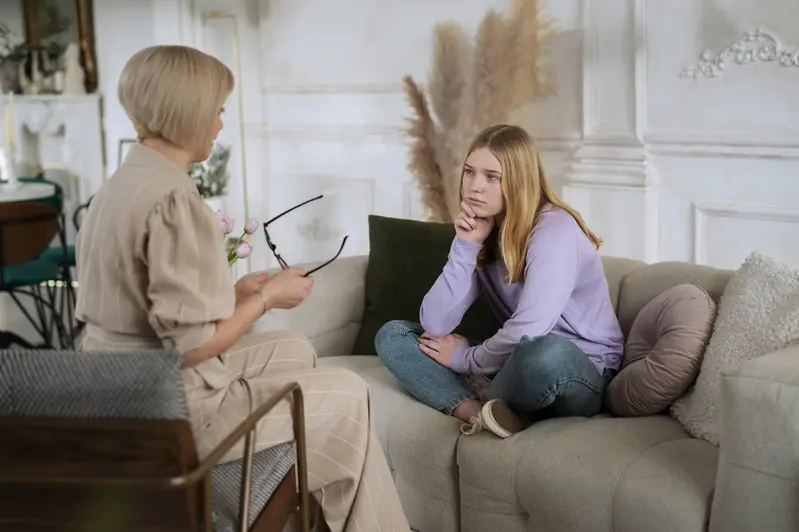Be heard. Feel connected. Know you're supported.
Therapy For Teenagers in Port Credit (Mississauga, ON)
It is completely normal for a teenager to feel a range of emotions when their parents are going through separation or divorce. This is a major life event for everyone in the family. Therapy can be helpful because it provides a safe space to talk about those feelings and work through them and it’s a chance for kids to have someone impartial to talk to who’s there just for them.


The Impact of Divorce on Adolescents
It is a challenging situation for teens as they are already going through the complex process of adolescence, trying to figure out their own identity and place in the world.
Here are a few ways divorce can affect teenagers:
– Firstly, it often disrupts their sense of stability and security.
Teenagers might find their living arrangements, daily routines, and even school life changing, which can lead to feelings of uncertainty and anxiety.
– Teenagers may experience a range of emotions such as sadness, anger, confusion, and even guilt.
They may feel torn between their parents or worry that they have to choose sides and they may even blame themselves for the divorce.
It is crucial to provide them with emotional support and reassurance during this time.
– Teenagers may exhibit changes in behavior due to the divorce.
Some may become withdrawn and isolate themselves, while others may act out and engage in rebellious behavior. It is important to create a safe and non-judgmental space for them to express their feelings and concerns.
Divorce can often disrupt a teenager’s focus and concentration, leading to a decline in academic performance. The stress and emotional upheaval can make it challenging to concentrate on schoolwork. Encouraging open communication and providing resources like tutoring or counseling can help them navigate these challenges. Some teenagers might find it difficult to express their feelings about the divorce or might not know how to cope with the emotional turmoil.
They may also feel uncomfortable discussing the situation with their parents, friends, or teachers. Divorce can impact a teenager’s trust and ability to form healthy relationships in the future. They may struggle with trust issues or fear of abandonment.
Finally, the impact on their social life can also be challenging. They might feel different from their peers, or they might face uncomfortable questions or comments about their family situation. This can lead to feelings of isolation or embarrassment.
It’s important to remember though, that every teenager is unique and will respond to divorce in their own way. Some might be resilient and adapt quickly, while others might struggle and need additional support.
Grief & Loss
Adolescence can be a challenging time, and when grief is added to the mix, it can become even more complex.
Grief during adolescence can stem from various sources, such as the loss of a loved one, a pet, a friend, or even changes like moving to a new place or school. Teens often experience grief differently than adults. They might have a wide range of emotions and can sometimes struggle to express them.
It’s crucial for parents, caregivers, and professionals to be supportive and understanding. Therapy can be a valuable resource in helping teenagers navigate their grief. It provides a safe, non-judgmental space for them to share their feelings, learn how to cope, and ultimately heal. So, if you know a teenager going through grief, therapy can be a helpful tool in their journey to healing and growth.
Why is grief and loss particularly difficult for adolescents? How can therapy help?
Firstly, grief is a complex and individual experience, and teenagers may not have developed the coping skills and emotional maturity to navigate it on their own. Therapy can provide a safe and non-judgmental space for them to express their feelings, process their emotions, and explore healthy ways to cope with their grief.
Secondly, grief can be overwhelming and impact various aspects of a teenager’s life.
It might affect their academic performance, relationships with family and friends, and overall well-being. A therapist can help them develop strategies to manage their grief-related challenges, maintain their daily functioning, and ensure their emotional well being.
Thirdly, a therapist can assist teenagers in understanding and accepting their grief. They can help them explore the stages of grief, normalize their emotions, and provide guidance on what to expect during the grieving process. This understanding can be empowering and reassuring, as it helps teenagers realize that their feelings are valid and normal. Additionally, in a supportive therapeutic environment, teenagers can learn healthy coping mechanisms and build resilience.
They can develop skills to manage their grief-related stress, find effective ways to express their emotions, and discover strategies to honor the memory of their loss. I can help your teenager navigate this challenging journey and find hope and healing along the way.
FAQ
The most frequent questions I am asked as a therapist for teenagers:
Teen therapy is a specialized form of counseling that addresses the unique emotional, psychological, and developmental needs of teenagers. It provides a safe space for teens to explore their feelings, thoughts, and behaviors.
Any teenager experiencing emotional, social, or behavioral challenges can benefit from therapy. This includes issues like anxiety, depression, stress, self-esteem, relationship problems, and academic concerns.
In a therapy session, the therapist will listen to the teen’s concerns, offer emotional support, and work collaboratively to develop strategies to manage challenges. Sessions are tailored to the individual’s needs and comfort level.
Each therapy session typically lasts about 60 minutes. The number of sessions varies depending on the teen’s needs and goals.
Yes, therapy is confidential. The therapist respects the privacy of each client. However, if there is a concern about safety, the therapist may need to share information with parents or guardians.
If your teen is showing signs of distress, such as mood swings, withdrawal, academic decline, or changes in behavior, it might be helpful to consult a therapist.
Parental involvement is often beneficial. The therapist may suggest family sessions or provide guidance on how to support your teen at home.
The therapist is a licensed professional with specialized training and experience in adolescent mental health and therapy.
You can make an appointment by contacting our office in the Port Credit area of Mississauga. We’ll provide you with available slots and further details.
The approach to therapy is client-centered, focusing on the teen’s individual needs. It may include cognitive-behavioral therapy, mindfulness, and other evidence-based practices.